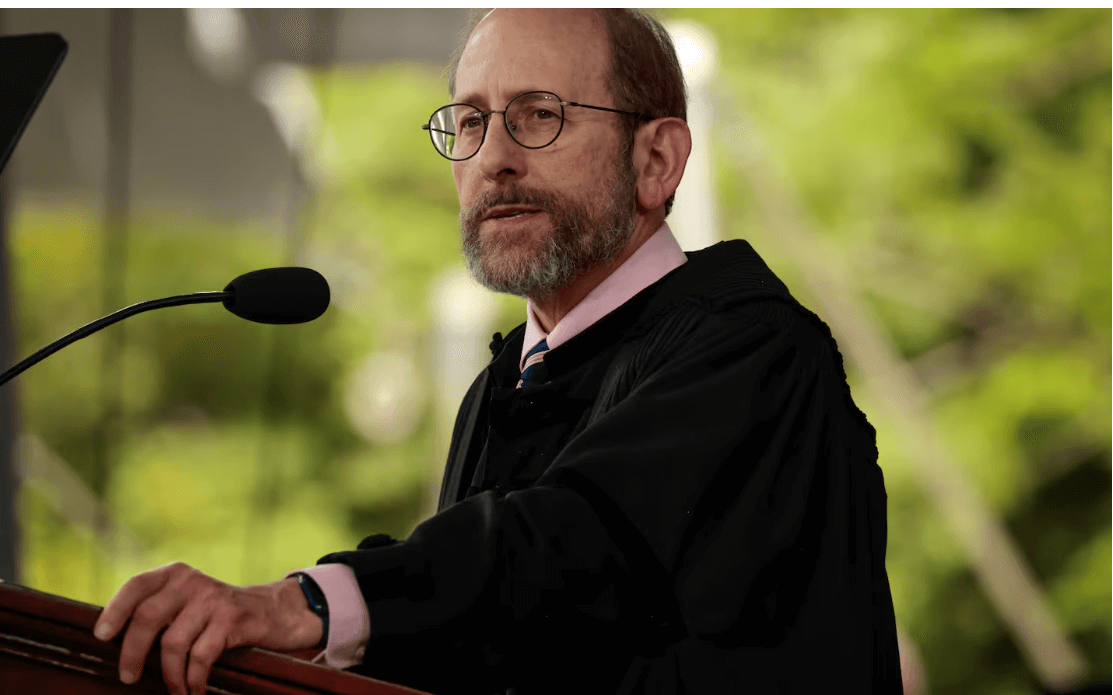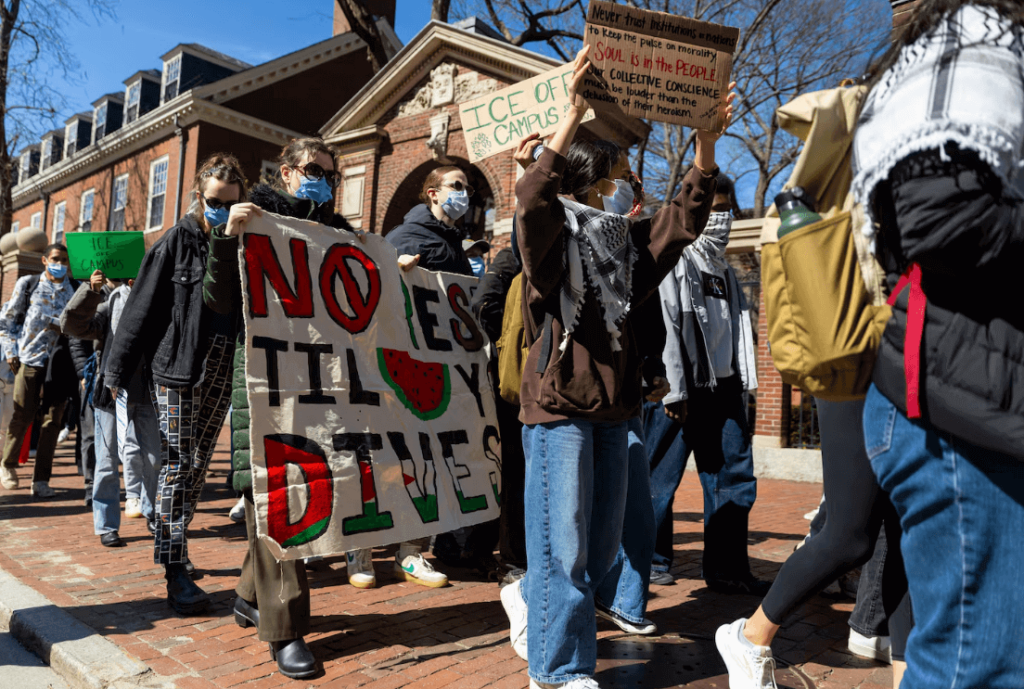特朗普威胁哈佛大学将削减数十亿美元的资金。但他希望哈佛大学做什么呢?

【中美创新时报2025 年 4 月 2 日编译讯】(记者温友平编译)特朗普政府周一宣布,如果哈佛大学“纵容反犹太主义滋生”,可能削减数十亿美元的联邦资金,这一消息令哈佛大学感到震惊,但一个核心问题仍未得到解答。政府到底想让哈佛做什么?《波士顿环球报》记者迈克·达米亚诺和希拉里·伯恩斯对此作了下述报道。
在哥伦比亚大学,特朗普 政府上个月也发出了类似的威胁,并取消了 4 亿美元的资助。 然后,它发出了一份学校必须满足的要求清单,以打击反犹太主义并控制亲巴勒斯坦抗议活动。
但自前哈佛大学校长克劳丁·盖伊辞职以来的 15 个月里,哈佛大学在回应校园反犹太主义指控时已经采取了许多类似的行动。
哈佛大学校长艾伦·加伯在周一晚间的一封信中表示:“我们完全拥护打击反犹太主义这一最阴险的偏见形式之一的重要目标,并且已经投入了相当大的努力来解决这一问题。”此前,政府宣布将“审查”用于哈佛大学及其附属机构(包括麻省总医院布莱根和波士顿儿童医院等顶级研究医院)的近 90 亿美元研究资金。
在哥伦比亚大学,白宫要求大学领导对校园抗议活动实施所谓的时间、方式和地点限制。哈佛大学去年就这么做了,并在学生和教授在校园图书馆抗议时执行了这些政策。
政府要求哥伦比亚大学对反犹太主义做出正式定义,并以哈佛大学在总统就职典礼的第二天(1 月 21 日)已经采用的定义为例。
有人指责哥伦比亚大学中东研究系在巴以冲突问题上教学存在偏见,有人批评其文章和活动带有反犹太主义色彩,随后,哥伦比亚大学管理部门指示哥伦比亚大学将其中东研究系置于“学术接管”之下。上周,哈佛大学更换了中东研究中心的领导,该中心也面临类似的指责。
所有这些政策都饱受争议,有时甚至引发教职员工抗议,甚至导致至少一人辞职。一些批评人士 认为,这些政策是压制不受欢迎的言论,并称它们将对以色列的合理批评与反犹太主义混为一谈。一些教授和学生认为,这些政策是取悦特朗普政府的错误举措。
一个亲巴勒斯坦的哈佛学生团体在周二的抗议声明中表示:“哈佛大学正在先发制人地遵守法西斯主义”,抗议哈佛大学对特朗普政府政策的回应,包括削减研究经费和逮捕与亲巴勒斯坦宣传有关的国际学生。
但哈佛的领导层坚持不懈,一些教授、学生和管理人员认为这是在认真努力地压制反犹太主义,遏制他们认为已经失控的抗议运动,并促进对有争议的问题进行更细致入微的教学。他们担心特朗普政府的干预可能会破坏他们所认为的进步。
哈佛大学心理学教授史蒂芬·平克 (Steven Pinker) 表示,变化“正在发生和酝酿”,他对校园反犹太主义以及教职员工缺乏意识形态多样性表示担忧。“这是我们过去两年一直在谈论的话题,”他说。

图片:4 月 1 日,抗议者聚集在哈佛大学外,表达对特朗普政府行为的不满。Brett Phelps 为《波士顿环球报》拍摄
他说,特朗普的威胁可能会使一些人认为的合法改革遭遇阻碍,因为这些改革看起来只是对政府要求的屈服。
平克还批评了特朗普政府的做法。周一宣布的审查似乎针对的是联邦政府各机构向哈佛大学及其附属机构提供的所有未偿付的研究资金。如果资金被削减,可能会取消从气候变化到癌症等主题的研究。
平克说:“用枪指着人的头并阻止一切科学研究似乎是解决反犹太主义特殊问题的一种适得其反的方法。”
但一些犹太倡导团体希望特朗普继续向哈佛施压。哈佛犹太联盟发言人罗尼·布伦表示,拨款审查可能会促使大学领导层确保“反犹太主义不会在哈佛产生、不会在哈佛得到宣传、不会在哈佛得到抬头。”
特朗普政府周一承认哈佛大学“最近采取了行动来遏制制度化的反犹太主义”,并称这些举措“值得欢迎”,尽管并没有具体说明具体指的是哪些政策。
政府反犹太主义特别工作组的政府律师乔希·格鲁恩鲍姆 (Josh Gruenbaum) 在一份声明中还表示,“该大学还有很多工作要做,才能保留获得联邦纳税人血汗钱的特权。”
目前,大学领导们正在等待观察这将会带来什么后果,以及特朗普政府将如何尝试执行任何要求。
大卫沃尔普 (David Wolpe) 是一位拉比,曾任哈佛大学神学院访问学者,目前仍活跃于该校的犹太社区,他说许多人对周一的消息感到“震惊”。
他说:“人们知道事情即将发生,现在事情就发生了。”他说,现在哈佛大学的学者们希望“这实际上是一次审查,而不是一把利斧。”
哈佛医学院前院长杰弗里·弗利尔 (Jeffrey Flier) 表示,特朗普政府“达到如此大的数字”——即审查中提出的 90 亿美元资助目标——的唯一方法是除了哈佛大学本身之外,还包括所有附属于哈佛大学的远程机构的研究资金。
这意味着,与哈佛大学没有多少联系的医生和科学家可能会因特朗普政府所指称的哈佛大学的失败而受到惩罚,而且似乎没有什么补救措施。
相关:哈佛法学教授警告称,惩罚律师事务所的行为威胁法治:“我们都非常担心”
哈佛大学附属贝斯以色列女执事医疗中心病毒学和疫苗研究中心主任丹·巴鲁奇表示,90 亿美元是“一个巨大的数字”,“让我对无数人在无数领域所做的工作感到担忧”。
巴鲁奇的中心帮助开发了强生公司销售的 COVID-19 疫苗。过去十年来,该中心获得了数百万美元的联邦资助,用于研发预防多种疾病(包括艾滋病毒)的疫苗。
巴鲁奇表示,他不知道特朗普政府的审查是否会危及该中心工作的资金,而且他目前也没有计划对此进行调查。
“我认为没人知道,”他说。“我甚至不知道该问谁。”
隶属于哈佛大学的麻省总医院布莱根医院首席执行官安妮·克里班斯基 (Anne Klibanski) 在周二下午给麻省总医院教职员工的一封信中表示,此次审查“仍存在许多悬而未决的问题”,她仍在努力“了解其广度”。
她说:“一旦获得更多信息,我们就会分享。”
一些犹太学生和教职员工表示,哈佛大学打击反犹太主义的措施已经奏效,并担心特朗普政府的干预可能会引发强烈反对,从而阻碍进步。
“我认为 [特朗普] 实际上并不关心反犹主义,”哈佛大学一年级学生埃文·爱泼斯坦 (Evan Epstein) 说。“他将其视为对高等教育发动战争的幌子。我喜欢人们谈论反犹主义,我希望更多人会这样做,但我认为他不是真诚的。我不认为他会提供帮助。”
周二,在哈佛大学科学中心外的集会上,哈佛医学院教授马克·艾森伯格表示,大学不应该“屈服于特朗普政府的要求”。
他说,他感到失望,因为哈佛大学校长加伯在周一的校园信中没有更有力地强调学术自由的重要性。
他说:“所有大学必须团结起来并表示‘不,我们不会投降’。”
《波士顿环球报》的乔纳森·萨尔兹曼对本报告做出了贡献。
题图:哈佛大学校长艾伦·加伯 (Alan Garber) 在周一晚间的一封信中表示:“我们完全接受打击反犹主义这一重要目标,这是最阴险的偏见形式之一”,并“已投入大量精力来解决这个问题”。Craig F. Walker/Globe 员工
附原英文报道:
Trump is threatening Harvard with funding cuts in the billions. But what does he want the university to do?
By Mike Damiano and Hilary Burns Globe Staff,Updated April 1, 2025, 7:32 p.m.
“We fully embrace the important goal of combatting antisemitism, one of the most insidious forms of bigotry” and “have devoted considerable effort to addressing” it, Harvard president Alan Garber said in a letter Monday night.Craig F. Walker/Globe Staff
As Harvard reeled from the Trump administration’s announcement Monday that it might cut billions in federal funding if the school “allow[s] antisemitism to fester,” a central question remained unanswered.
What, exactly, does the administration want Harvard to do?
At Columbia University, the Trump administration made similar threats last month and canceled $400 million in funding. Then it sent a list of demands the school must meet to combat antisemitism and control pro-Palestinian protests.
But Harvard has already undertaken many similar actions during its response to allegations of antisemitism on campus in the 15 months since former Harvard president Claudine Gay resigned.
“We fully embrace the important goal of combatting antisemitism, one of the most insidious forms of bigotry” and “have devoted considerable effort to addressing” it, Harvard president Alan Garber said in a letter Monday night after the government announced a “review” of nearly $9 billion of research funding destined for Harvard and affiliated institutions, including top research hospitals like Mass General Brigham and Boston Children’s Hospital.
At Columbia, the White House, asked university leaders to implement so-called time, manner, and place restrictions on campus protests. Harvard did that last year, and then enforced those policies when students and professors protested in a campus library.
The government told Columbia to adopt a formal definition of antisemitism, and cited as an example the definition that Harvard had already adopted on Jan. 21, the day after the presidential inauguration.
The administration instructed Columbia to place its Middle East studies department under “academic receivership” after it was accused by some of biased teaching on the Israeli-Palestinian conflict and criticized for writings and events some saw as antisemitic. Harvard moved last week to replace the leadership of its Center for Middle Eastern Studies, which has faced similar accusations.
All of these policies have been controversial, at times prompting faculty protests and at least one resignation. Some critics see them as attempts to repress disfavored speech and say they conflate legitimate criticism of Israel with antisemitism. Some professors and students cast them as misguided efforts to appease the Trump administration.
“Harvard is preemptively complying with fascism,” a pro-Palestinian Harvard student group said in its announcement of a protest on Tuesday against Harvard’s response to the Trump administration’s policies, including cuts to research funding and arrests of international students linked to pro-Palestinian advocacy.
But Harvard’s leaders have persisted in what some professors, students, and administrators see as a serious effort to tamp down antisemitism, restrain a protest movement that they believe had gotten out of control, and promote more nuanced teaching on deeply contested issues. They worry the Trump administration’s intervention could disrupt what they see as progress.
Changes are “happening and brewing,” said Steven Pinker, a Harvard psychology professor who has expressed concern about campus antisemitism and what he contends is a lack of ideological diversity among the faculty. “It’s all we’ve been talking about for the last two years,” he said.
Protesters gather outside Harvard University to show their disapproval of actions taken under the Trump administration, on April 1.Brett Phelps for The Boston Globe
The Trump threats, he said, could short-circuit what some view as legitimate reforms by making them appear to be mere capitulation to government demands.
Pinker also criticized the Trump administration’s methods. The review announced Monday seems to target all outstanding research funding to Harvard and its affiliates from across federal government agencies. If the funding were cut, it could eliminate research on subjects from climate change to cancer.
“The gun to the head and shut[ting] down all science seems like a counterproductive way to handle the particular problems of antisemitism,” Pinker said.
But some Jewish advocacy groups want Trump to keep the pressure on Harvard. Roni Brunn, a spokesperson for the Harvard Jewish Alliance, said the grant review could push the university’s leaders to ensure that “antisemitism isn’t created at Harvard, isn’t platformed at Harvard, isn’t elevated at Harvard.”
The Trump administration acknowledged on Monday that Harvard had taken “recent actions to curb institutionalized antisemitism” and called those measures “welcome,” although it did not specify which policies it was referring to.
It also said, in a statement from Josh Gruenbaum, a government lawyer working with the administration’s antisemitism task force, “there is much more that the university must do to retain the privilege of receiving federal taxpayers’ hard-earned dollars.”
Now university leaders are waiting to see what that might entail, and how the Trump administration might try to enforce any demands.
David Wolpe, a rabbi and former visiting scholar at Harvard’s Divinity School who has remained active in the university’s Jewish community, said many reacted to Monday’s news with “expected shock.”
“People knew something was on the horizon and here it is,” he said. Now, he said, Harvard academics are hoping “this will actually be a review and not a cleaver.”
Jeffrey Flier, a former dean of Harvard Medical School, said the only way the Trump administration could “get to such a big number” — the $9 billion of funding targeted in its review — was by including research funding destined for all the far-flung institutions that are affiliated with Harvard, in addition to the university itself.
That means physicians and scientists with little connection to the university could be punished for what the Trump administration alleges are Harvard’s failings, with seemingly little recourse.
Dan Barouch, head of the Center for Virology and Vaccine Research at Beth Israel Deaconess Medical Center, which is affiliated with Harvard, said $9 billion is “a huge number” that “makes me worry about the work that countless people do in countless areas.”
Barouch’s center helped develop the COVID-19 vaccine marketed by Johnson & Johnson. The center has received millions of dollars in federal funding over the past decade to work on vaccines to prevent multiple diseases, including HIV.
Barouch said he had no idea whether funding for his center’s work could be imperiled by the Trump administration’s review, and had no immediate plans to inquire about it.
“I don’t think that anybody knows,” he said. “I wouldn’t even know who to ask.”
Anne Klibanski, chief executive of Mass General Brigham, which is affiliated with Harvard, said in a message to MGB’s faculty Tuesday afternoon that “[t]here are many open questions about” the review and she is still working “to understand its breadth.”
“When more information is known, we will share it,” she said.
Some Jewish students and faculty members said Harvard’s measures to combat antisemitism have worked, and expressed concern the Trump administration’s intervention could roll back progress by creating a backlash.
“I think [Trump] doesn’t actually care about antisemitism,” said Evan Epstein, a first-year Harvard student. “He sees it as a front in his war on higher education. I like that people are talking about antisemitism, and I wish that more people would, but I don’t think that he’s genuine. And I don’t think he is going to help.”
At the rally outside Harvard’s Science Center on Tuesday, Mark Eisenberg, a professor at Harvard Medical School, said universities should not be ”capitulating to the demands of the Trump administration.”
He said he was disappointed Garber, the Harvard president, did not more strongly emphasize the importance of academic freedom in his campus letter Monday.
”Universities all have to get together and say, ‘No, we won’t capitulate,’ ” he said.
Jonathan Saltzman of the Globe staff contributed to this report.

